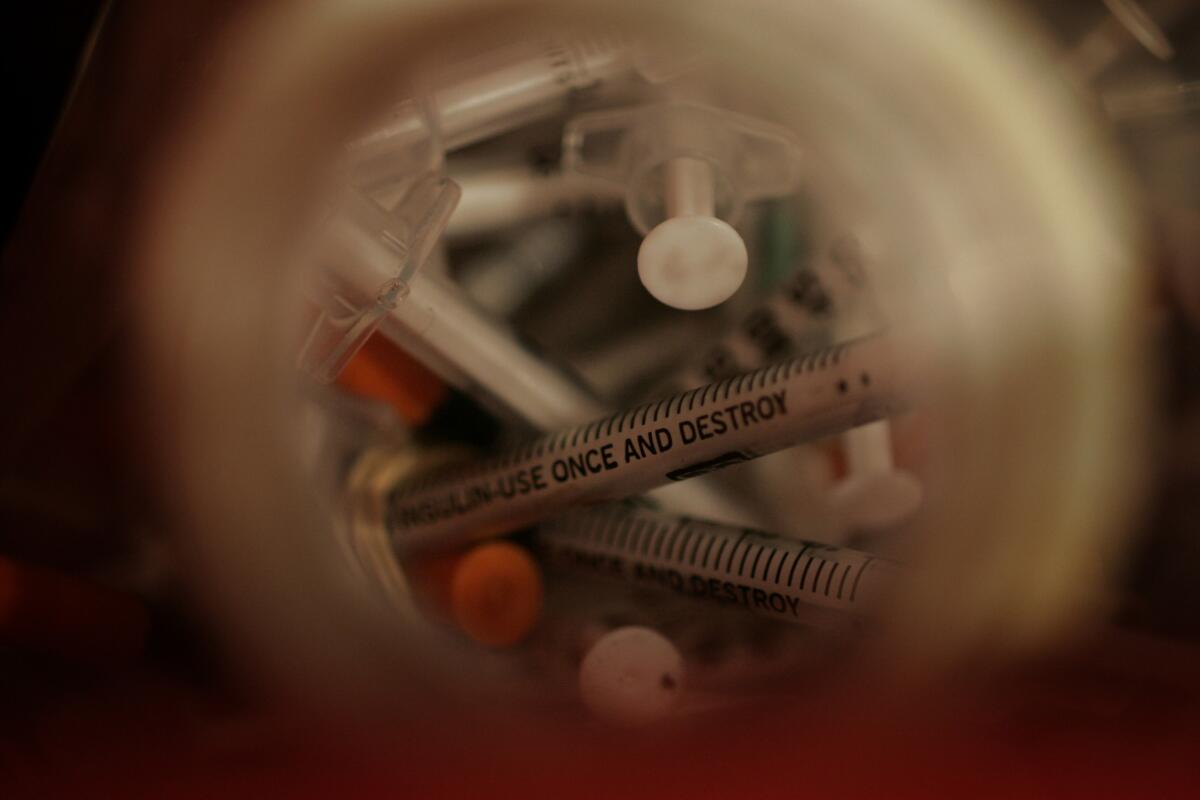Orange County just launched its first clean-needle exchange

The volunteer-run nonprofit in Santa Ana allows drug users to exchange dirty needles for clean ones to help reduce their risk of infection or disease. It also provides safe-injection supplies such as tourniquets and cotton.
- Share via
A year ago, a group of UC Irvine medical students realized that Orange County was missing what they considered an important public health service that every major city in California had access to: a clean-needle exchange program.
So they decided to do something about it.
The students organized with partners across the region and submitted a plan to the California Department of Public Health. The agency rejected the plan last summer, noting a lack of community support and funding for a program.
Undeterred, the group revised the plan, finding a more acceptable location and raising money to support the venture. And last week, their work paid off: They won state approval to open Orange County’s first needle exchange.
The thinking behind such programs is that if drug use can’t be halted, at least substituting clean needles for dirty ones means that users face less exposure to diseases and infections.
The Orange County Needle Exchange Program opened last week at the Santa Ana Civic Center in a mobile site behind City Hall.
“I’m from San Francisco, where needle exchanges are very common and widely acknowledged to be an important factor in stemming the HIV epidemic,” said Kyle Barbour, a founding member of the O.C. exchange and a second-year medical student. “So I was shocked to find that Orange County didn’t have one. We know that needle exchanges are safe, cheap and effective.”
The original plan to house the exchange at an LGBT center in Santa Ana was met with resistance by police and residents.
“We thought from a public safety standpoint that the first location was problematic,” said Santa Ana Police Chief Carlos Rojas. “It was in a neighborhood with schools and a house of worship and looked like it would have led to more calls for service.”
So the group worked with the Police Department and other community groups to find a location everyone could agree on. The Santa Ana Civic Center, Rojas said, made the most sense.
“It’s away from residential areas,” he said. “We have a large homeless population there and a high concentration of IV drug users, so we saw this area as being more beneficial not only for the people who will be using the service, but also from a public safety aspect.”
The organizers then raised $100,000 — enough to keep the exchange running for several years, they estimate — from groups including the California Medical Assn. Foundation and the Elizabeth Taylor AIDS Foundation.
Barbour said one of the biggest obstacles to the exchange has been fear.
“There’s been 40 years of research on needle exchanges, and not a single scientific study has demonstrated that there’s any harm either for public safety or public health,” he said. “But despite that, there’s a lot of fear of needle exchanges and injection drug users.
“That fear often translates into a lack of political support. Our clients are injection drug users and sex workers — marginalized and largely oppressed populations. Their interests are by and large not heard, and as a consequence, elected officials feel that if they support those interests, they may suffer in the polls for it.”
The exchange provides up to 20 more needles than the number turned in by a person, as well as safe-injection supplies such as cookers, tourniquets and cotton; condoms and lubricant; and a list of community resources for services such as housing and healthcare. The exchange is also working with community partners to provide on-site HIV and pregnancy testing.
The exchange, a volunteer-run nonprofit, now boasts a long list of community supporters, including the Orange County Medical Assn., the AIDS Service Foundation of Orange County and the LGBT Center OC.
Barbour hopes the program’s opening signals a broader change.
“We feel the approval of the Orange County Needle Exchange Program epitomizes Orange County gradually coming into the modern era,” he said, “so that whether you’re poor, stigmatized, minority or majority, you have access to the basic healthcare services that everyone deserves.”
Kandil writes for Times Community News.
More to Read
Get the Latinx Files newsletter
Stories that capture the multitudes within the American Latinx community.
You may occasionally receive promotional content from the Los Angeles Times.






